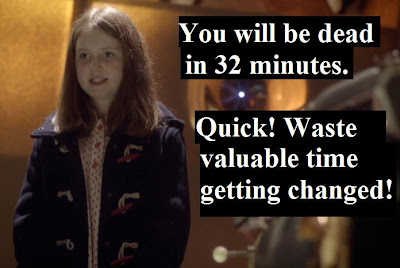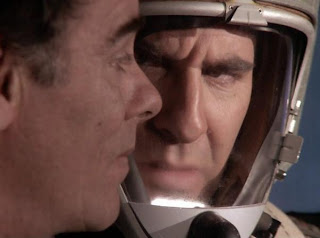Doctor Who
The Wedding Of River Song
Series Six, Episode Thirteen
This year, for the first time ever, we weren’t terribly fussed about the Doctor Who finale. This is possibly because Series Six hasn’t so much gripped us as pinched us in passing. Where’s it all going? Is it going anywhere, or will Steven Moffat just keep raising questions ad infinitum?
After twelve episodes of infuriatingly vague allusions and questions, we were wondering how he’d fit it all into one episode. Silly us. In a display of blatant anti-climax, Moffat ducks the Great! Big! Finale! and does something smaller instead. Which might be fine if he hadn’t done exactly the same thing last year (right down to the weird muddled-up Earth history), and if this series wasn’t the worst one yet for unanswered questions. Moffat lives to surprise us, but in this instance all that involves is serving up a disappointingly flippant finale instead of a satisfying one. Wow. You had us going there, Moff.
Contrary to what we were all expecting, The Wedding Of River Song is about what happens when the Doctor doesn’t die. This creates a whole alternate universe where time stands still, but all happens at the same time, but doesn’t move, but also does. (Don’t even bother trying to make sense of it, because he certainly hasn’t.) The Doctor must die to put it right.
This is all (arguably) quite interesting (although we guessed immediately from the trailer that the Dalek and pterodactyls would be pointless cameos), but what’s it got to do with the finale? We want to know if the Doctor dies; we want to know how he’ll escape his fate; we want to know the answers to all the questions Moffat’s left hanging over the past few months.
And, surprise! Approximately five minutes of this episode is devoted to answering those questions. As much fun as the previous forty minutes is, it’s all just an elaborate distraction from what little effort has gone into the finale. Twelve episodes, an entire infuriating year, for five minutes.

Series Six has been so ambivalent on what’s an actual mystery and what’s just unclear (the ‘in the flesh’ line in Night Terrors, for instance, is just an editing mistake, and the Doctor’s bizarre costume change in Let’s Kill Hitler apparently happened for no reason whatsoever) that we don’t even know if it’s worth paying attention any more. That trail through time the Doctor was doing at the start of the year, pointless. Everything in The Impossible Astronaut was irrelevant, including Canton, the fourth most important person in the Doctor’s life because he has a can of petrol. The way several parentally-themed episodes were stacked next to each other, coincidence. The only thing that came back was that stupid robot, which is one of those ideas we immediately noticed and threw out because that would be a terrible solution.
And sure enough, it drains the entire dramatic core of the episode. It’s supposed to be about the Doctor choosing to die, and River accepting that she must kill him. Potent stuff. Except, surprise! Neither of them has to bother! This is sledgehammeringly obvious just looking at the Previously clip, not to mention how the Tesselecta marches into the episode for no better reason than delivering the Doctor’s mail, and anyway, even before we’d ever heard of the Tesselecta, we all assumed the Doctor was faking his death. To wait a year and get to the last couple of minutes and get, Guess What? He FAKED his death… Isn’t the episode supposed to be ahead of us? Why didn’t the Doctor mention this to Amy and Rory at any point? He’s got a perfect opportunity on top of the pyramid*, and all three of them find out later anyway.
Better still, why didn’t he tell River the first time round on the beach, instead of being pointlessly evil and making her think she was murdering him? But then, maybe he just doesn’t want her to know her life sentence is really a total waste of time. As we knew it would be.
(And what’s all this faking-his-death stuff actually in aid of? Steven Moffat supposedly wants the Doctor to be less well-known, and we get a throwaway line at the end about the Doctor getting ‘too big’, but how’s that possibly going to work? Isn’t a member of the Silence going to notice that he’s still zipping about righting wrongs? Because, call us psychic, we think he might keep doing that, it being the premise of Doctor Who. Talk about shortsighted.)
The sad thing is, for all his efforts to surprise us, Moffat’s just not that good at it. Who’s in the spacesuit? Exactly who you thought it would be. Who’s the Good Man that dies? Exactly who you thought it would be. Who is River? Exactly who she tells you she is every week. What is the Oldest Question In The Universe? Exactly what you were absolutely terrified it might be but prayed it wasn’t. (Dear God.) If these revelations aren’t revealing anything new to anyone, as few of Moffat’s revelations ever are, why drag them out? It just increases the disappointment.
Speaking of disappointments, poor Amy and Rory! The heart of the show, reduced to bystanders by this point. What a lovely way for them to spend the finale: blank parallel universe copies with sort-of amnesia. Did he really only invent them in the first place so that River could be born? Well, this is River Who, after all.
Not that we learn anything new about River. The Doctor marries her because… why? No idea. There’s still no reason for her to be in love with him (she’s a psychopath, oh right, well that explains that), and their relationship continues to be entirely tell rather than show, so it’s impossible to get invested. (Yet another scene of them flirting while a bystander rolls their eyes does not help in the slightest.) At least it’s over now, sort of, we think. We have no idea if this is the last we’ll see of River, or for that matter, Amy and Rory. Their journeys aren’t over, but they didn’t go anywhere.
Does River’s journey to Lake Silencio make more sense now? Er, not exactly. It’s irrelevant that she was trained to kill him, since the suit shoots automatically. And once again, she is the worst person to pick to assassinate him, because while she might be fresh out of life-giving regenerations, she can now apparently control the suit enough to not kill him if she feels like it, which she obviously will, since she apparently loves him more than anyone**. Aargh! The whole thing is pointless. (And all based on the frankly loony premise that you can just invent a fixed point in time. Eh? Since when? And why didn’t any of this happen in The Waters Of Mars?)
Which reminds us: what, exactly, was the point of Madam Kovarian? Did the Silence even need a human rep? What do the Silence actually hope to achieve, and why does their mission statement keep fluctuating? Why do they even need River/baby Melody if the Doctor can be killed by poison and/or a gun?
Amy’s cold-blooded murder of Madam K is probably meant to be closure of some sort; what a pity that this is the first genuine feeling Amy’s had on the matter since it kicked off. (And you call this closure? Most people we’ve spoken to were hoping for something positive, like River rewriting time so that the Doctor didn’t have to die and Amy got to keep the baby, or something at least. Alas, we get a nasty out of character didn’t-really-happen murder which sends horrendous signals to the kids in the audience. Don’t like someone? Kill ’em! It just goes to show us, never speculate. Your best theories will never happen, and your worst fears are the cream of Steven Moffat’s wish list.)

It’s the finale’s job to make sense of the series before it, and The Wedding Of River Song just doesn’t try. Take that blanket explanation for everything, ‘the Doctor lies’, which is swiftly becoming the verbal equivalent of the sonic screwdriver. Now River’s caught the lying bug, too. How come she had no idea what was going on in The Impossible Astronaut? Oh, right, she was pretending. How tediously disappointing. (And unconvincing. Call us pessimists, but we don’t think Alex Kingston brought ‘lying’ across in her acting. Just look at all those times she had no chemistry with Amy or Rory.)
We’d get all angry about how this was clearly made up on the spot, if it weren’t for the Doctor contradicting this by telling River she won’t remember a thing. Er, which is it then? And how are we ever supposed to follow any of this if the characters retroactively turn out to be ‘lying’ whenever it suits the writer? It’s cheating, and it’s a slap in the face if you’ve bothered to keep up with the series.
If you’re not invested in this at all, maybe it’s not that bad. Matt Smith’s very good, especially during the phone-call to an old companion (at least one of us had a lump in our throat), and the rest. Arthur Darvill’s very good, although he’s not playing Rory per se, which is a shame. The episode has enough budget crammed into it to look good; what a pity all the pretty stuff is totally wasted. (Air balloon cars?)
But we are invested in it. Weird and vague as Series Six might have been, we still tried to follow it, and yet it turns out most of it was a mixture of red herrings and muddy writing. THAT was IT? We’re guessing it’s a little late to ask what the hell the Series Five finale was about, then, or any of it really, because at this point God only knows. And now we’ve been given even more portentous nonsense that may or may not actually bother going somewhere. Next time, we just won’t care.
We don’t want portents. We don’t want arcs so heavy they ruin stand-alone episodes, and when we pay attention, we want it to count. We want to enjoy the show. If only we could tear off our Eye-Drives and go back to the relatively blissful days of Series Five. Is it just us, or has everything since then felt like a bad dream?
*What are they doing on that pyramid anyway? Everyone in the universe has come to help you! Oh well, moving on and ignoring that before it goes anywhere interesting…
**And welcome to Rose Tyler levels of selfishness. The entire population of the universe suffering and dying is worth it if she gets to hang out with the Doctor. Don’t marry her, slap her.











